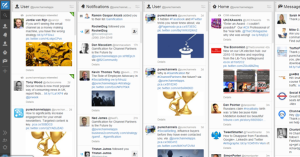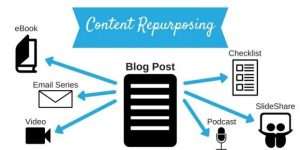I could write the answer to this blog post in about one sentence. Why do you need to stop using buzzwords? Because you sound like a pompous prat. And an idiot. And like you are only using buzzword for effect.
That was 3 sentences. I might as well carry on then.
Buzzwords. The dictionary definition reads;
a word or phrase, often an item of jargon, that is fashionable at a particular time or in a particular context.
There are two immediate red flags within that description. First, jargon. Normal people don’t use jargon. Jargon is what pushy SEO salespeople use to sell you costly packages that are just full of really rubbish (blackhat) methods of ranking your website and content that are more likely to earn you a Google penalty in the long run than earn your website or business for that matter any credibility. Or dodgy used car salesmen use when they are trying to flog you a heap of junk.
Second, fashionable. What may be the hottest bit of slang or buzzword this week will leave future readers/viewers/listeners confused. If your content is about something that is only relevant right now then the odd buzzword won’t make you sound too stupid I suppose.
If you have to use buzzwords to describe something it means you aren’t describing it very well. When your reader/viewer has to pause for a second to think about what the hell you’re referring to, then you’ve lost the audience. It’s like the equivalent of a comedian telling a bad joke and nobody laughs and he’s still got 10 minutes left on stage to die a slow death.
Ok, so it’s not as bad as dying on stage, but it is still losing your audience.
Keep It Simple
A wise, very wise author told me some time ago that the easiest way to get people to read and keep on reading your stuff was to keep it simple. Using straightforward plain English and avoiding jargon means that your readers concentration just flows along with your writing. If they have to think mid-sentence about what a word means or the context of the fashionable buzzword, you break their concentration. The readers flow stops and you then have an uphill battle to maintain their interest.
It’s the same with buzzwords. How many times have you started reading a blog post or article and within the first paragraph you’ve encountered some new buzzword or a really obscure word and you’ve had to think about what the writer is on about? What do you then do? Chances are you stop reading and move on to reading something else.
Also, think about how many times you’ve seen a buzzword used in someone’s bio. How does that make you feel? Probably not very interested in that person. Probably not very convinced of their business credentials. You may have even asked yourself what exactly it is this person does as you can’t make much sense of their bio. Chances are they don’t really know themselves, hence the need to use lots of buzzwords usually out of context.
TIP: If you struggle to pronounce it, then it shouldn’t be there in the first place.

Do you feel like you need help whenever you read buzzword laiden content?
10 Buzzwords That Need To Be Retired…….. Now!
There are hundreds of buzzwords that are annoying. Many have become like badges of honour for some people. The rest of us just cringe at the very usage. I’ve narrowed it down to 10 that really make me roll my eyes, tut, cringe, feel slightly ill or if we were to put them on a scale of 1 to 10, by level 10 I feel the need to punch the screen that I’m seeing the buzzword on. Or maybe the person using it. Or just buy them a dictionary so they can look up the true meaning of the word they insist on using.
On the scale of 1 to 10 all of these are over a 6 but in no particular order. You can figure out your own order.
Game Changer
An app is not a game changer. Instagram Stories is not a game changer. Any new function an existing app introduces is not a game changer. Any new app is not a game changer. The internet was a game changer. Anything new added on to it is just an upgrade.
A game changer has to be something unique and totally brand new. Like a cure for cancer. That would be a game changer.
Another game changer is when the eternally injured Jermaine Beckford comes on as a sub in the 85th minute. We’re 2-1 down and we need to win to stay up and it’s the last game of the season. He scores a hat-trick in 5 minutes, the whites stay up and Beckford is a hero. That’s a game changer. Around 99.9% of you reading this won’t have a clue what I just referred to. That’s what it’s like reading your damn buzzwords! The 0.01% that do get, just did a fist pump and said “Get in” under their breath.
Thought Leader
If you call yourself a thought leader, then you aren’t one. It’s as simple as that. The definition of a thought leader is;
Thought leaders are the informed opinion leaders and the go-to people in their field of expertise. They are trusted sources who move and inspire people with innovative ideas; turn ideas into reality, and know and show how to replicate their success.
Steve Jobs was a thought leader. Mark Zuckerberg is a thought leader. Elon Musk, Richard Branson, Mother Theresa. Are you seeing a pattern here? Your average five bob social media “expert” is not a thought leader. They would need to have unique thoughts for a start. But that’s a whole other gripe for another day.
Visionary
The adjective of visionary is;
1.thinking about or planning the future with imagination or wisdom.
2. relating to or having the ability to see visions in a dream or trance, or as a supernatural apparition.
The noun for visionary is;
a person with original ideas about what the future will or could be like.
Visionaries are pretty much the same types of people as thought leaders. They have huge ideas and they make them happen. Or employ the right people to make it happen. A great example is John F Kennedy when he said he would put a man on the moon. Having not been around at the time I can’t say for sure, but I would imagine a whole load of normal working class people rolled their eyes at that one. The average man on the street probably thought it was a ridiculous idea. But to JFK it was a vision and he found a way to make it happen.
Those that like to self-title themselves visionaries I think may be referring to adjective 2 and they just dream things up. Along with the other buzzwords they use.
Millennial
This one is starting to annoy me. It’s getting close to my level 9 annoyance factor. Very soon it will be 10. Not that it’s a ridiculous word. It’s the context far too many people use it in. They don’t fully understand marketing or even the word and they use it in far too generic terms and not in the right context.
By definition at millennial is;
adjective
1.
denoting or relating to a period of a thousand years.
“the current increase in hurricanes is only a small fluctuation within this longer millennial cycle”
2.
denoting or relating to an anniversary of a thousand years.
“the millennial anniversary of Leif Eiriksson’s voyage to the New World”
noun
a person reaching young adulthood around the year 2000.
“the industry brims with theories on what makes millennials tick”
In marketing terms, millennials are often referred to as the generation everyone wants to market to and understand. Many think they are young people. But do some maths here and some logical thinking. If someone reached young adulthood around the year 2000, so let’s say they hit 18 that year, that would now make them 34. Young adulthood could also mean 16 to some people or even university finishing age of around 22. So basically a millennial is currently aged between 32 and 38.
Therefore, by saying you want to market to millennials you are just saying you want to market to people currently aged 32 to 38. Give or take a couple of years and say 30-40.
Just think about that for a second.

Are you marketing to just an age range?
If you know anything about marketing or understand it’s fundamentals you know what an absolutely ridiculous statement that is. Millennial is just a reference to someone’s age. Not their culture, interests, aspirations, status, beliefs, standards, wants, needs, all the things you would establish about your ideal client before marketing to them.
Calling yourself a millennial means absolutely nothing. You’re just saying how old you are. It says nothing about you as a person or your abilities. You can’t establish facts about someone based on what year they were born in.
If I said in my bio that I’m a 40-year-old single parent business owner, that would actually tell you way more about me than if I just said I was a millennial (ok so I’m pushing the age range a bit there).
Innovative/Innovate/Innovator/Innovation
The word innovative in all its different forms means new, advanced, original, creative. Very few things these days are any of those things. Very few. It’s 2016. Most things have been done at this stage so to come up with something so brand new it can be classed as innovative is a remarkable feet of sheer genius. Chances are it’s not happening in any marketing related industries. Snapchat is not innovative. It’s just a different way of uploading a piece of media to the internet.
Often the word disruptive is added before innovation to describe something that creates a new market disrupting the old market. To me, disruptive is a negative word so I’m not sure how it helps to describe something that is potentially good in a negative format. But I’m sure the technology disruptors have their own language anyway.
Influencer(s)
This is really simple. If you are calling yourself an influencer, then you aren’t one. Remove it from your bio immediately and never say those words again.
To be an influencer you have to be able to influence. Just because you do a hundred Snapchats a day of you drinking coffee that does not make you an influencer. It makes you a boring idiot. You may even have a large audience but unless you can mobilise that audience into taking decisive action then you aren’t influencing them. Therefore you are not an influencer.
Storytelling
Wikipedia says;
Storytelling is the social and culture activity of conveying stories in words, sounds, and/or images, often by improvisation, theatrics, or embellishment. Stories or narratives have been shared in every culture as a means of entertainment, education, cultural preservation and instilling moral values.
Embellishment. Do you see that word in there? Do you know what it means? I get sick of hearing about how you should just tell your story. Your story this, your story that. A story, to most people, is what they read their kids at night. It’s a work of fiction.
Some of the stories I hear certain social media people and marketers telling are just that. Totally embellished works of fiction.
Instead of banging on about your (boring) story why don’t you try doing some actual work and getting some actual clients so then you can use examples of your experience to demonstrate your knowledge and ability to do whatever it is you do. See how that sounds better than just telling your story (Jackanory).
*if you understand the Jackanory reference then tweet me what it is.
Viral
For some odd reason, I can never get past thinking virus when I hear the word viral. Anyway, perhaps that’s just my odd mind.
Right, in all seriousness, your content won’t go viral. No chance. It’s the absolute extreme that it happens, not the just a little bit out of the ordinary. It just doesn’t happen and you certainly can’t plan for it.
Going viral is like Chewbacca Mom, the Periscope Puddle, the McChicken Sandwich guy (do not Google that if you don’t know what it is!!!). Going viral will never be your highly planned, constructed, edited video or blog. Sorry, but that’s just the nature of viral content.
Viral is not so much a buzzword, well yes it is in a way, but it’s a term being thrown around too much and gives businesses especially a false expectation that their content will go viral. After all, everyone is talking about stuff going viral. It’s just another social media urban myth.
Unicorns

Unicorns? Really?
Ok, perhaps this is more pet hate. Unicorns are cute. For kids. They also aren’t real. Grow up.
Evangelist
I keep seeing this one cropping up. Clearly, people haven’t actually investigated the true meaning of the word and just thought it sounded cool.
noun
1.
a person who seeks to convert others to the Christian faith, especially by public preaching.
“an American television evangelist”
synonyms: “people flocked to hear evangelists preach”2.
the writer of one of the four Gospels (Matthew, Mark, Luke, or John).
“St John the Evangelist”
As you can see, absolutely nothing to do with marketing, social media, the internet, business or well anything other than its true meaning. It’s a classic buzzword usage gone wrong.
Call it a buzzword faux pas.
There’s one more buzzword that I’ve reserved a special place for. It’s number 11 in the top 10 buzzwords. It’s that annoying it doesn’t even belong in the top 10 as it’s in a class all of its own………….
Guru
The sheer mention of the word makes me feel annoyed. Honestly, who actually still uses that word to describe themselves? Isn’t it short for arrogant egotistical arsehole? I’m sure if you translated it into plain English it would come out with a load of expletives to describe someone.
Actually just read Wikipedia’s description of Guru’s and you will find there is absolutely no mention of social media “experts”, marketing types or just anyone that uses it in their Twitter bio.
If someone uses guru in their bio, just presume they don’t actually know what they are on about since they haven’t even researched the title they have given themselves. And then move on to follow someone else.
What are your pet hate buzzwords? Hit me up in the comments so we can all laugh at them together to relieve the annoyance levels they cause.
Business & Finance Articles on Business 2 Community(55)






